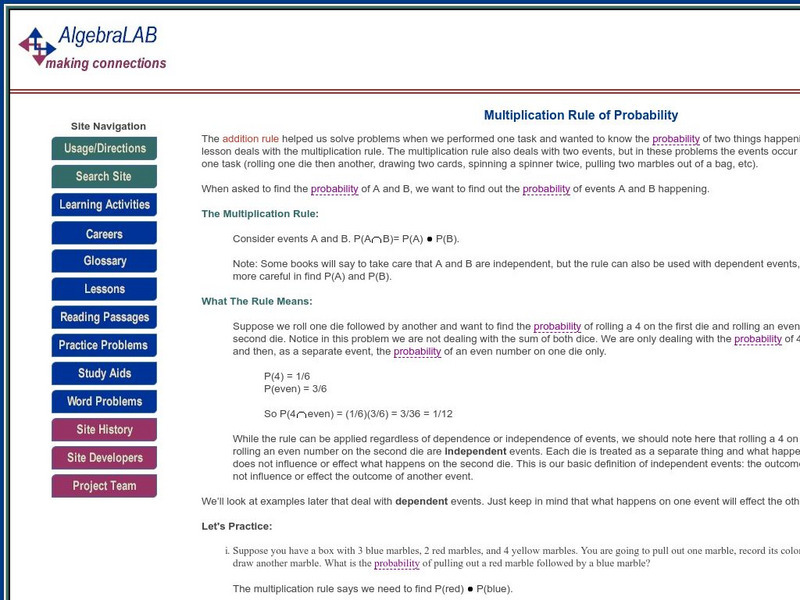Illustrative Mathematics
Illustrative Mathematics: 7.rp Thunder and Lightning
Alyssa sees a lightning bolt in the sky and counts four seconds until she hears the thunder. Aligns with 7.RP.A.
Illustrative Mathematics
Illustrative Mathematics: 7.sp.6 Heads or Tails
Each of the 20 learners in Mr. Anderson's class flipped a coin ten times and recorded how many times it came out heads. Aligns with 7.SP.C.6.
Illustrative Mathematics
Illustrative Mathematics: 7.sp.8 Tetrahedral Dice
Many games use dice which are six-sided and fair (meaning each face on the die is equally likely to land face up). Many games also use the sum of two dice rolled at the same time to determine movement of game pieces. However, not all...
Illustrative Mathematics
Illustrative Mathematics: 7.sp.6 Tossing Cylinders
Think about a cylindrical (or cylinder-like) object, such as a bottle lid or a roll of tape. Some possible objects are shown in the picture below. Suppose you were to toss one of these objects into the air and observe their landing...
Illustrative Mathematics
Illustrative Mathematics: 7.sp.7a How Many Buttons?
Look the shirt you are wearing today, and determine how many buttons it has. Then complete the following table for all the members of your class. Aligns with 7.SP.C.7.a.
Other
Algebra Lab: The Multiplication Rule of Probability
An explanation with examples of how to calculate probabilities of two dependent or independent events by multiplying their probabilities. Practice problems are provided along with their explanations.
Mathigon
Mathigon: Probability and Discrete Math: Monty Hall
This lesson focuses on the Monty Hall game where you select one of three doors. It explains your odds based on your choices.
Discovery Education
Discovery Education: Understanding Probability
In this lesson plan, students will learn what probability is; ways to express probability as a ratio, a decimal, and a percentage; and how to solve problems based on probability.
Mathigon
Mathigon: Probability and Discrete Math: True Randomness
This lesson focuses on randomness; it explains that what we often think of as random is only random because we do not have the tools to make better predictions. However, true randomness does exists -- at the very foundations of matter. A...
Alabama Learning Exchange
Alex: Puzzling Pangaea
In this lesson students will work collaboratively to research information in order to prove or disprove if a super continent ever existed. Students will create a model of Pangaea to show how their research findings 'connect' in a puzzle...
Alabama Learning Exchange
Alex: Maybe Maybe Not
In Maybe, Maybe Not students will explore and investigate components of probability. This lesson will enable students to develop understanding of a likelihood line and apply events to the line. This lesson plan was created by exemplary...
Alabama Learning Exchange
Alex: What's the Chance?
Students engage in opportunities to label events that are likely, unlikely, certain and impossible. This lesson plan was created by exemplary Alabama Math Teachers through the AMSTI project.
Alabama Learning Exchange
Alex: Maybe Maybe Not
This is a beginning activity on the concept of probability. Through a series of informal comparisons, the student will explore the chances of various outcomes of an event. The student will use vocabulary associated with probability.This...
Alabama Learning Exchange
Alex: Probability
The purpose of this lesson is to begin the process of helping students to learn the basic principles of probability. The students will also collect data, interpret data, and determine the fairness of the game rock, paper, scissors.This...
Alabama Learning Exchange
Alex: Jelly Beans Add Up
The instructional activity will explore counting, sorting, and graphing skills. The instructional activity provides students an exciting and fun way of exploring and internalizing graphing, sorting, and counting skills. Realistically,...
Better Lesson
Better Lesson: The Chances Are, You Will Do Great! A Review of Probability
An engaging review that not only allows students to practice their skills but also maintains a slight edge of competitiveness!
Better Lesson
Better Lesson: I Can See the Future!
How do we use ratios to make predictions? Let's find out!
Better Lesson
Better Lesson: It's All About Chance
The students will be learning about probability language and how it pertains to their lives.
Khan Academy
Khan Academy: Addition Rule for Probability (Basic)
Venn diagrams and the addition rule of probability.
Better Lesson
Better Lesson: Survey Skills: Assessment
Today we become Gallup Poll central as students take a set of collected data and create a visual representation using the skills that have been taught over the past few lessons.
Better Lesson
Better Lesson: Our Own Surveys
Operation Independence! Students will now take what they have learned from previous data lessons and put it into action. The students will work in pairs of two to decide on a survey question and then collects classmates' responses to...
Better Lesson
Better Lesson: Unit Assessment
Survey says? That is the question today, as students work on three different tasks to assess the how they are doing with the skills from the current unit.
Shodor Education Foundation
Shodor Interactivate: A Better Fire!!
Students run a simulation of how a fire will spread through a stand of trees, learning about probability and chaos.
Better Lesson
Better Lesson: Powerful Protein
The ability to making informed decisions about nutrition is built on using multiplication, division, and an understanding of grams and portion size.









